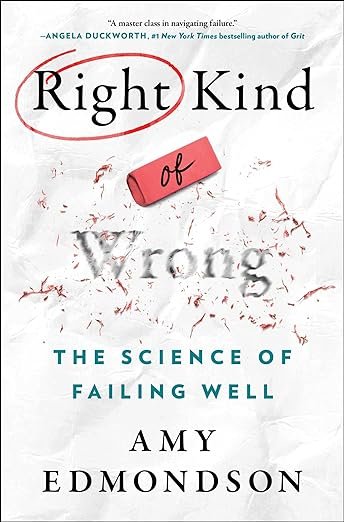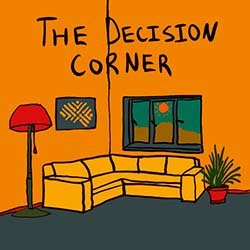The end of the calendar year often offers a chance for us all to slow down, enjoy time with family and friends, cozy up with a blanket and, hopefully, relax. This year saw more practical applications of BI, including books applying BI to life setbacks, communications, and stress management, among others.
We've compiled a list of recommendations for you to enjoy this holiday season. We hope that they provide some enjoyment, allow you to reflect on the year past, or provide inspiration for the year ahead.
Enjoy, and happy holidays!
Right Kind of Wrong: The Science of Failing Well by Amy Edmondson
Amy Edmondson provides specifically tailored practices, skills, and mindsets to help us replace our understandings of failure and instead approach our life and work with curiosity, vulnerability, and personal growth. A must read for those of us with a tendency towards perfectionism. – Lindsay Miles-Pickup, BC Behavioural Insights Group
Writing for Busy Readers: Communicate More Effectively in the Real World by Todd Rogers and Jessica Lasky-Fink
This punchy new book has a simple argument: Write less, more effectively. The authors (two behavioural scientists) present six principles for crisp, reader-friendly writing. I especially like how they use data to make their case, including survey responses and randomized experiments. They also recommend useful templates and techniques, such as adding headings for navigational cues and writing for readers who skim. Your email recipients will thank you. – Vince Hopkins, University of British Columbia
Cash Transfers for Inclusive Societies: A Behavioral Lens edited by Jiaying Zhao, Saugato Datta, and Dilip Soman
I'm looking forward to reading this book, which is the latest in a series of great BI books from Behaviourally Informed Organizations. The co-editors are leaders in the field of BI and the book promises "practical advice on how best to successfully design, deliver, and evaluate efficient cash transfer programs, with a view to alleviating poverty". And, not for nothing, JZ is a UBC-DIBS superstar and our 2024 BIG Difference BC keynote speaker! – Kirstin Appelt, UBC Decision Insights for Business & Society
Why Zebras Don't Get Ulcers: The Acclaimed Guide to Stress, Stress-Related Diseases, and Coping by Robert M. Sapolsky
This book by world-renowned stress neurobiologist and professor at Stanford University makes the complicated physiology of stress accessible to non-scientist audiences. Stress is something that impacts all of us pretty frequently (any time the environment changes or challenges us), and as behavioural insights practitioners and humans, it provides insights into how profoundly stress impacts our health, wellbeing, and behaviour. – Craig Hutton, BC Behavioural Insights Group
The Book of Why: The New Science of Cause and Effect by Judea Pearl and Dana Mackenzie
This book by Turing Award winning computer scientist and statistician Judea Pearl and mathematician Dana Mackenzie offers a non-technical introduction to the study of causal inference, with a focus on an intuitive visual approach of using directed acyclic graphs for causal analysis and reasoning. This book, which requires no prior training or knowledge on the topic, uses many examples to demonstrate how causality can be evaluated for some research questions even when it is not feasible to run a randomized controlled trial. – Craig Hutton, BC Behavioural Insights Group
Science Fictions: How Fraud, Bias, Negligence, and Hype Undermined the Search for Truth by Stuart Ritchie
Everyone should be reading this book to strengthen their ability to see through the veil of bad science of all kinds: fraud, bias, negligence, and hype. Of all, scientific hype is probably the most dangerous as hyped science is more frequent and less challenged. – Tak Ishikawa, BC Behavioural Insights Group
The Implications of Behavioural Science for Effective Climate Policy – Output 2: Policy Recommendations by Centre for Climate Change and Social Transformations (CAST)
Reaching our global emission reduction targets requires large-scale behaviour change. Downstream approaches must be combined with government policy to address economic, social and structural barriers. This report outlines behavioural science principles for designing effective climate policies. – Anna Burrowes, BC Behavioural Insights Group
Finding Out ‘What It’s Like to Be…’ Through Slow Curiosity by Dan Heath in Behavioral Scientist
I find Dan Heath’s call for curiosity for curiosity’s sake in this article quite charming. Connecting the slow movement with asking questions of various professionals on his podcast, Heath asks why we shouldn’t find value in being curious with no end in mind. — Steph Wilkie, BC Behavioural Insights Group
Looking to immerse yourself in the behavioural sciences for eight hours? Then why not check out the video from the Nudgestock Lite 2023 event put on by Ogilvy Consulting. — Carl Jensen, BC Behavioural Insights Group
The Decision Corner Podcast, Episode 64: “Creating people-centered behavioral public policy” with Elizabeth Linos
Occasionally, you come across someone who has eloquently articulated something that you’ve been noodling over in your head for ages. Elizabeth Linos did this for me repeatedly in this podcast where she touches on many of the tensions, limitations, and opportunities at the intersection of behavioural science and public policy. If your work or interests are also in this space, I encourage you to go for a walk, pop in this podcast, and refresh your excitement about the future of the field. — Mikayla Ford, BC Behavioural Insights Group















